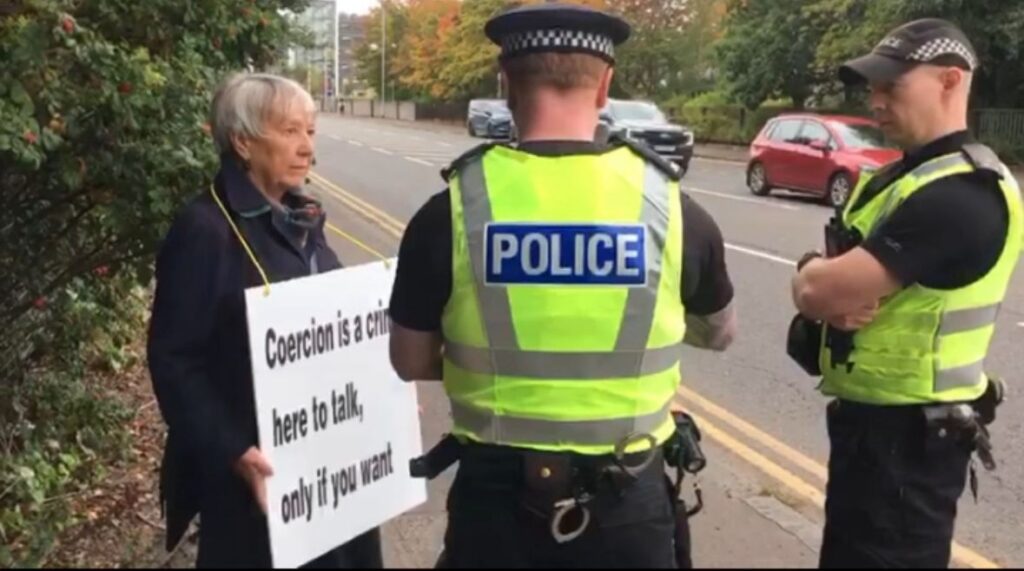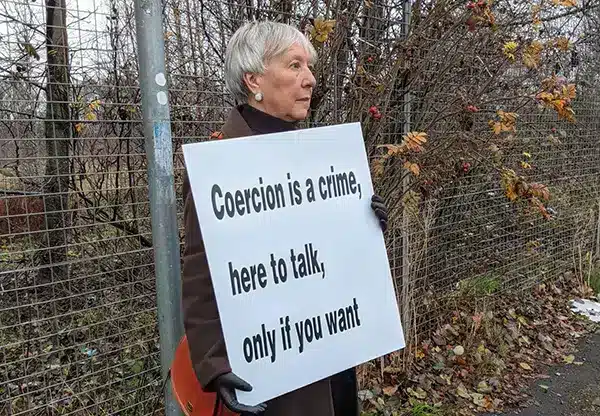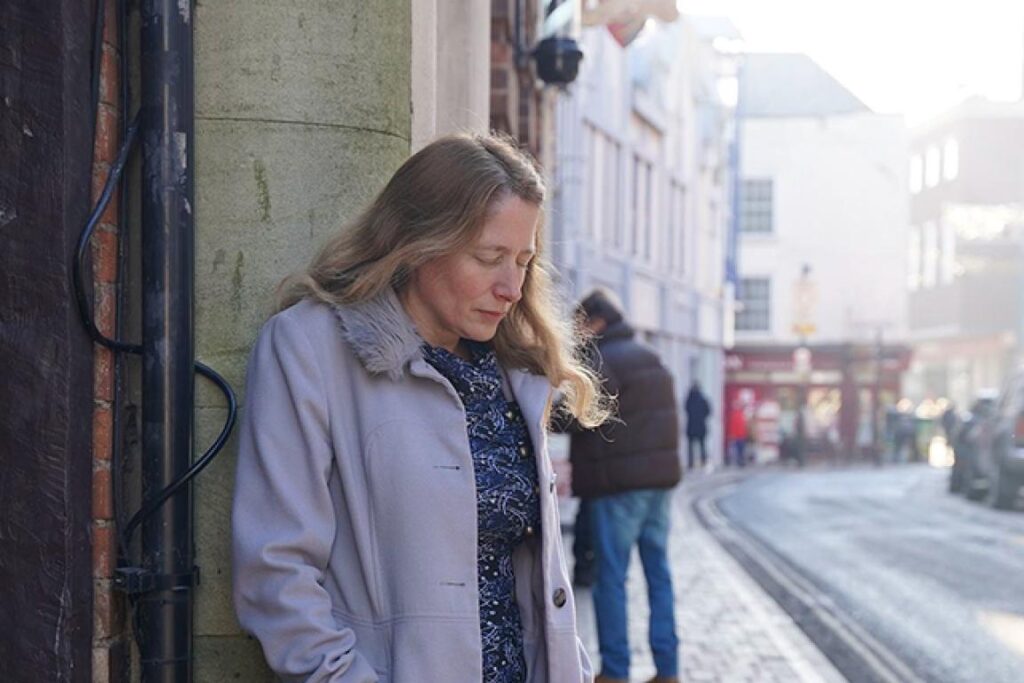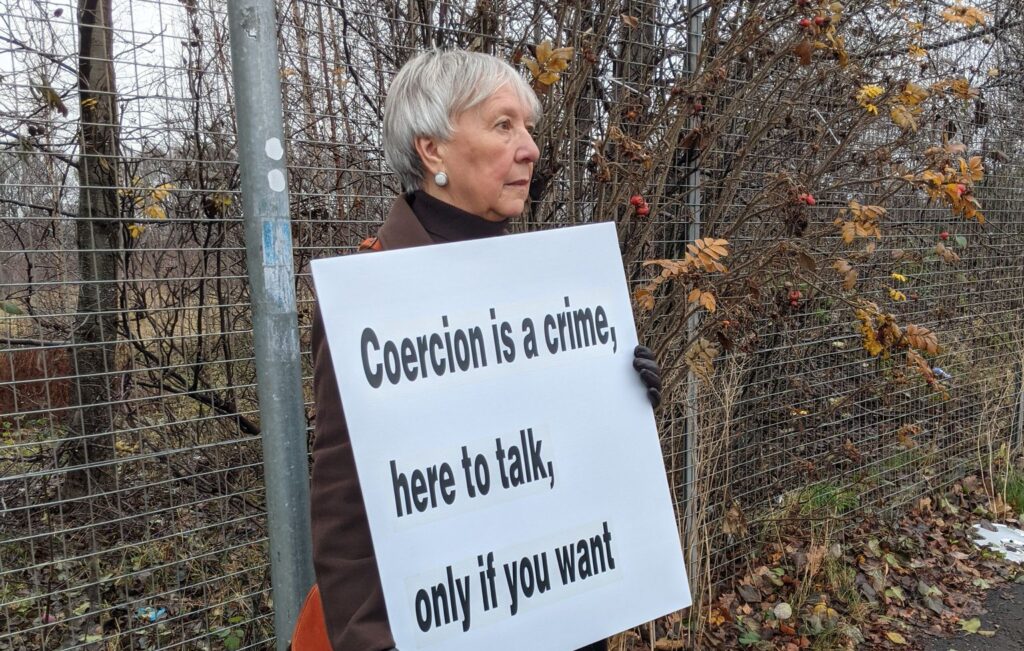Arrested Again for Offering Consensual Conversation
Rose Docherty, aged 75, is criminally charged for holding a sign reading “Coercion is a crime, here to talk, only if you want” within 200m of a hospital.

"I should not be treated as a criminal for inviting people to chat with me - lending a listening ear." - Rose Docherty
You are currently viewing a placeholder content from YouTube. To access the actual content, click the button below. Please note that doing so will share data with third-party providers.
More InformationShe was holding a sign which read: “Coercion is a crime, here to talk, only if you want.”
Rose was later released on bail under a law which imposes so-called “buffer zones” outside Scottish abortion clinics.
That came after she was held in custody for several hours.
She was refused a chair in her cell, despite telling police she had a double hip replacement.
What Happened to Rose Should Concern Us All
Despite only having stood silently offering consensual conversation and not having approached any individual, Rose has been charged with breaching the “buffer zone.”
In Scotland, “buffer zones” are enforced within 200m of every hospital, forbidding harassment, intimidation, and “influencing” of anyone seeking to access abortion services.
Reacting to her arrest, Rose said:
“Everybody has the right to engage in consensual conversation. I held my sign with love and compassion, inviting anyone who wants to chat, to do so – and stood peacefully, not approaching anyone.
“I should not be treated as a criminal for inviting people to chat with me – lending a listening ear. Conversation is not forbidden on the streets of Glasgow. And yet, this is the second time I have been arrested for doing just that.”
In August, Scottish authorities dropped their case against Rose for holding the same sign in the same place after a global outcry against the 75-year-old grandmother’s arrest, including concerns raised in an online post by the U.S. State Department.
After her arrest this week, Rose was held in custody for several hours. She was refused a chair to sit on in her cell, despite making it known that she had a double hip replacement.
Rose has been charged and released on bail. Stringent bail conditions prevent her from attending an area marked out to be wider than the initial “buffer zone” area, in a move the legal team at ADF International call “disproportionate”.
Your generosity allows us to provide legal support at no cost to our courageous clients.

This is not a case about harassment, intimidation or violent protest – this is simply a grandmother, who held a sign offering to speak to anyone who would like to engage.

Lorcan Price
Legal Counsel for ADF International

FAQ
A censorship zone sets out a defined area around an abortion facility that prevents citizens from engaging in otherwise legal activities within it. Prohibited activities can include offering leaflets about crisis pregnancy support services, or even praying quietly alone.
Censorship zones around abortion facilities can include several streets within their circumference and are usually intended to prevent any contact between citizens entering a facility and those engaging in pro-life activities.
Censorship zones are sometimes referred to as ‘buffer zones’, ‘bubble zones’ or ‘access zones’ by their proponents. The problem with this terminology is that it suggests that there is a need for society to be ‘buffered’ from all of the activities included in such measures, many of which are reasonable or even beneficial to others. While everyone condemns harassment – which is already a crime – censorship zones have been instrumentalised to criminalise people peacefully offering help, or simply thinking pro-life thoughts, on public streets.
ADF UK stand firmly against harassment against women in any circumstances. Censorship zones (so-called “buffer zones”) aren’t the solution to protecting women from harassment.
Harrassment is illegal in England, Wales and Northern Ireland under – to name just one example – the Protection from Harassment Act 1997 (and the adjacent Protection From Harassment (Northern Ireland) Order of the same year).
In Scotland, if someone is engaging in harassment, they can be subject to a non-harassment order. If that order is breached, it’s an offence with up to 2 years jail time. Censorship zones, then, wouldn’t newly ban harassment. They would, however, newly ban other forms of behavior which are perfectly legal, protected in human rights law under freedom of speech, thought, and assembly, and indeed can be a vital lifeline to women.
In 2018, the UK Home Office reviewed the situation outside abortion facilities nationwide. Considering evidence gathered about harassment, the Home Secretary at the time said this: “…what is clear from the evidence we gathered is that these activities are not the norm, and predominantly, anti-abortion activities are more passive in nature. The main activities reported to us during protests include praying, displaying banners, and handing out leaflets.” (Since 2018, there has been no evidence of a substantive escalation of any violence, abuse, or harassment outside of abortion facilities).
The Home Secretary thus concluded, “Introducing national buffer zones would not be a proportionate response, considering the experiences of the majority of hospitals and clinics, and considering that the majority of activities are more passive in nature.” This conclusion corresponds with the testimonies of women who say they felt helped, not harassed, by volunteers in nearby abortion facilities. Alina Dulgheriu is one such woman who has made her story public. She was alone, abandoned, and jobless when she found herself in a crisis pregnancy.
Like almost 1 in 5 women who have abortions, she felt pressured into the decision. She thought she had no choice but to abort her child. Fortunately, Alina received a leaflet about help available, right at her point of need. She chose to accept the offer and flourishes as a mother today. Find her story, as well as others, at www.behereforme.org.
PSPOs were designed to grant local authorities the power to target particular anti-social activities such as dog fouling, control of fires & barbecues etc. Parliament did not intend such orders to be used as unaccountable tools to restrict fundamental rights and freedoms.
Unlike Court Orders, injunctions or other targeted measures, PSPOs are not targeted at any specific individual and are easier for councils to implement with more limited accountability and scrutiny.
The question of intentions is a good one that ought to be more common in debates concerning criminal law. Increasingly, we are seeing criminal laws apply without reference to the accused’s intentions, with the feelings of the accuser treated as almost sacrosanct, and officers unthinkingly arresting individuals in public spaces based on reports that some bystanders are offended instead of considering the fundamental rights at play.
In a democratic society, being offended by others is a given. It is a significantly less costly price to pay than ceding fundamental rights to the state. We know from history that once fundamental rights are ceded, the state will very rarely, if ever, willingly give them back.
The law should be able to differentiate between silent unassuming prayer and charitable offers of help and criminal harassment and intimidation. PSPOs conflate all of these, bringing the threshold of criminality to an impermissibly low level. The government should look at the PSPO legislative regime and either scrap it in its entirety or expressly prohibit any interference with the peaceful exercise of fundamental rights.
The reference to intimidation in Isabel’s charge is particularly alarming. At all material times, Isabel prayed silently while the abortion facility was closed. The wording of the charge appears to accuse her of intimidating by silent prayer, which is wholly new territory.
In Scotland and Northern Ireland, proposed national buffer zones legislation broadens criminal liability to any “influencing activity”. The scope of this term is so vague and unclear that it betrays the basic rules of good law. Indeed, the scope is so broad that it would inevitably lead to numerous unjust arrests and needless interferences with the fundamental rights of people to think and speak on the public street freely.
In a recent submission to the Supreme Court, the Lord Advocate for Scotland clarified her belief that silent prayer should be treated the same as violent or threatening behaviour, alleging that silent prayer could be ‘psychologically damaging’.
For those who remain unconvinced that pro-life volunteers outside abortion facilities help women, please see the accounts of these women.
Pro-choice advocates should see the glaring inconsistency in arguing for a woman’s right to choose abortion while simultaneously denying their right to choose to engage in offers to discuss charitable alternatives to abortion.
A woman’s freedom to choose to keep her child does not suddenly disappear as she approaches the public spaces around an abortion centre.
The idea that a decision has already been made ignores the fact that women are often unsure, coerced, confused or otherwise pressured toward abortion.
Importantly, the idea that a woman has already made her decision when approaching the abortion centre cannot be reconciled with the fact that abortion centres are themselves meant to provide counselling support, including support for those wishing to keep their child.
Such support would be unnecessary if it is assumed that the visiting woman has already made an unchangeable decision.
No. The paramount rights in law, in this case, are freedom of thought and religion. Freedom of thought is an absolute right, which means the state cannot interfere with it under any circumstances.
Freedom of religion can only be interfered with by the state when strictly necessary and proportionate to do so. Given that Isabel and Adam both stood and prayed silently in a public space, it is hard to see how an arrest, prosecution or penalty fine could ever be justified.
Stay Informed
Get involved! Sign up to receive updates:
"*" indicates required fields


